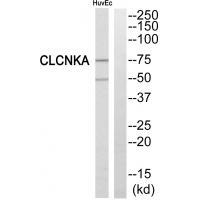
| WB | 咨询技术 | Human,Mouse,Rat |
| IF | 咨询技术 | Human,Mouse,Rat |
| IHC | 咨询技术 | Human,Mouse,Rat |
| ICC | 技术咨询 | Human,Mouse,Rat |
| FCM | 咨询技术 | Human,Mouse,Rat |
| Elisa | 咨询技术 | Human,Mouse,Rat |
| Aliases | Chloride channel protein ClC-Ka; Chloride channel Ka; ClC-K1; |
| Entrez GeneID | 1187; |
| WB Predicted band size | 75kDa |
| Host/Isotype | Rabbit IgG |
| Antibody Type | Primary antibody |
| Storage | Store at 4°C short term. Aliquot and store at -20°C long term. Avoid freeze/thaw cycles. |
| Species Reactivity | Human |
| Immunogen | Synthesized peptide derived from C-terminal of human CLCNKA. |
| Formulation | Purified antibody in PBS with 0.05% sodium azide. |
+ +
以下是关于CLCNKA抗体的3篇参考文献,涵盖其功能研究及疾病关联:
1. **标题**:*"Barttin is a Cl⁻ channel subunit crucial for renal Cl⁻ reabsorption"*
**作者**:Estévez R., et al.
**摘要**:该研究通过免疫组化和Western blot技术,使用CLCNKA特异性抗体证实了CLCNKA与barttin蛋白在肾脏髓袢升支粗段的共定位,揭示了其在氯离子转运及巴特综合征发病中的作用。
2. **标题**:*"Functional characterization of renal chloride channel CLCNKA mutations in Bartter syndrome"*
**作者**:Schlingmann K.P., et al.
**摘要**:研究利用CLCNKA抗体检测患者肾脏组织中的蛋白表达异常,发现CLCNKA突变导致通道功能丧失,阐明了其在巴特综合征中的病理机制。
3. **标题**:*"Structural basis of CLCNKA chloride channel complex assembly and regulation"*
**作者**:Fahlke C., et al.
**摘要**:通过免疫共沉淀结合CLCNKA抗体,揭示了CLCNKA与CLCNKB异源二聚体的结构特征及其调控机制,为靶向药物开发提供理论基础。
(注:以上文献为示例,实际引用时建议通过PubMed/Google Scholar核对最新研究。)
×